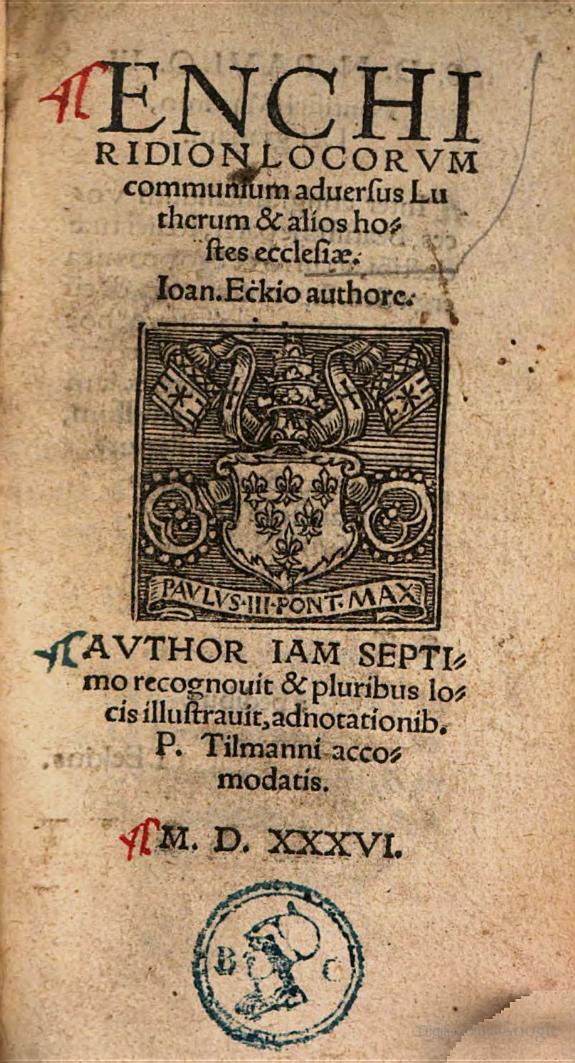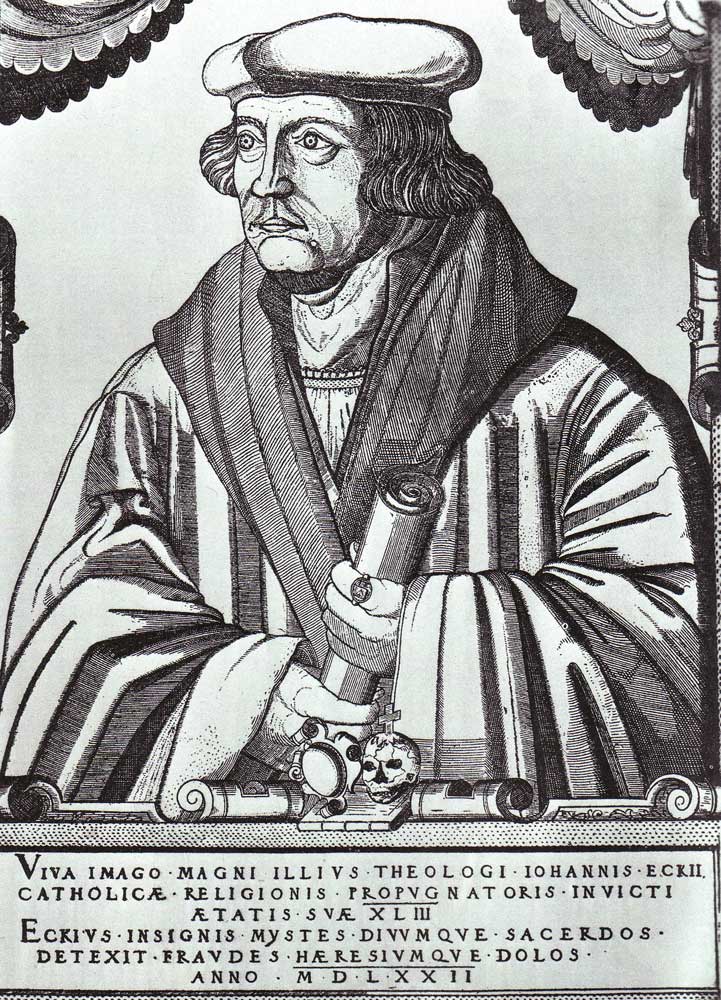John Calvin lists what he believes to be the basic objections the Roman Catholic Church held against the Reformation in the 16th Century.
- "They call it "new" and "of recent birth."
- "They reproach it as "doubtful and uncertain"
- "They inquire whether it is right for it to prevail against the agreement of so many holy fathers and against ancient customs"
- "They urge us to acknowledge that it is schismatic because it wages war against the church",
- It supposes "that the church was lifeless during the many centuries in which no such thing was heard."
- "one can judge by its fruits what it is, seeing that it has engendered such a heap of sects, so many seditious tumults, such great licentiousness."
"These were the staple arguments against Luther and the other Reformers from the beginning," according to John T. McNeill, and best represented by John Eck's book: Enchiridion locorum communium adversus Lutheranos (1526, 1536) [Enchiridion PDF]. John Eck's work was printed 91 times in 1600 and dedicated to Henry VIII and Thomas Moore.
The following quotation from the Beveridge translation contains this summary and John Calvin's brief rebuttal to the charges.
Charges of Antagonist Refuted: Newness, Uncertainty; The Value of Miracles
Nevertheless, they cease not to assail our doctrine, and to accuse and defame it in what terms they may, in order to render it either hated or suspected. They call it new, and of recent birth; they carp at it as doubtful and uncertain; they bid us tell by what miracles it has been confirmed; they ask if it be fair to receive it against the consent of so many holy Fathers and the most ancient custom; they urge us to confess either that it is schismatical in giving battle to the Church, or that the Church must have been without life during the many centuries in which nothing of the kind was heard. Lastly, they say there is little need of argument, for its quality may be known by its fruits, namely, the large number of sects, the many seditious disturbances, and the great licentiousness which it has produced. No doubt, it is a very easy matter for them, in presence of an ignorant and credulous multitude, to insult over an undefended cause; but were an opportunity of mutual discussion afforded, that acrimony which they now pour out upon us in frothy torrents, with as much license as impunity, [12 “Tam licenter quam impune,” not in Ed. 1536.] would assuredly boil dry.
1. First, in calling it new, they are exceedingly injurious to God, whose sacred word deserved not to be charged with novelty. To them, indeed, I very little doubt it is new, as Christ is new, and the Gospel new; but those who are acquainted with the old saying of Paul, that Christ Jesus “died for our sins, and rose again for our justification” (Rom. 4:25), will not detect any novelty in us. That it long lay buried and unknown is the guilty consequence of man’s impiety; but now when, by the kindness of God, it is restored to us, it ought to resume its antiquity just as the returning citizen resumes his rights.
2. It is owing to the same ignorance that they hold it to be doubtful and uncertain; for this is the very thing of which the Lord complains by his prophet, “The ox knoweth his owner, and the ass his master’s crib; but Israel doth not know, my people doth not consider” (Isaiah 1:3). But however they may sport with its uncertainty, had they to seal their own doctrine with their blood, and at the expense of life, it would be seen what value they put upon it. Very different is our confidence—a confidence which is not appalled by the terrors of death, and therefore not even by the judgment—seat of God.
3. In demanding miracles from us, they act dishonestly; for we have not coined some new gospel, but retain the very one the truth of which is confirmed by all the miracles which Christ and the apostles ever wrought. But they have a peculiarity which we have not—they can confirm their faith by constant miracles down to the present day! Way rather, they allege miracles which might produce wavering in minds otherwise well disposed; they are so frivolous and ridiculous, so vain and false. But were they even exceedingly wonderful, they could have no effect against the truth of God, whose name ought to be hallowed always, and everywhere, whether by miracles, or by the natural course of events. The deception would perhaps be more specious if Scripture did not admonish us of the legitimate end and use of miracles. Mark tells us (Mark 16:20) that the signs which followed the preaching of the apostles were wrought in confirmation of it; so Luke also relates that the Lord “gave testimony to the word of his grace, and granted signs and wonders to be done” by the hands of the apostles (Acts 14:3). Very much to the same effect are those words of the apostle, that salvation by a preached gospel was confirmed, “The Lord bearing witness with signs and wonders, and with divers miracles” (Heb. 2:4). Those things which we are told are seals of the gospel, shall we pervert to the subversion of the gospel? What was destined only to confirm the truth, shall we misapply to the confirmation of lies? The proper course, therefore, is, in the first instance, to ascertain and examine the doctrine which is said by the Evangelist to precede; then after it has been proved, but not till then, it may receive confirmation from miracles. But the mark of sound doctrine given by our Saviour himself is its tendency to promote the glory not of men, but of God (John 7:18; 8:50). Our Saviour having declared this to be test of doctrine, we are in error if we regard as miraculous, works which are used for any other purpose than to magnify the name of God. [13 No part of the passage, beginning above, “The deception,” &c., is in Ed. 1536.] And it becomes us to remember that Satan has his miracles, which, although they are tricks rather than true wonders, are still such as to delude the ignorant and unwary. Magicians and enchanters have always been famous for miracles, and miracles of an astonishing description have given support to idolatry: these, however, do not make us converts to the superstitions either of magicians or idolaters. In old times, too, the Donatists used their power of working miracles as a battering-ram, with which they shook the simplicity of the common people. We now give to our opponents the answer which Augustine then gave to the Donatists (in Joan. Tract. 23), “The Lord put us on our guard against those wonder—workers, when he foretold that false prophets would arise, who, by lying signs and divers wonders, would, if it were possible, deceive the very elect” (Mt. 24:24). Paul, too, gave warning that the reign of antichrist would be “withall power, and signs, and lying wonders” (2 Thess. 2:9).
But our opponents tell us that their miracles are wrought not by idols, not by sorcerers, not by false prophets, but by saints: as if we did not know it to be one of Satan’s wiles to transform himself “into an angel of light” (2 Cor. 11:14). The Egyptians, in whose neighbourhood Jeremiah was buried, anciently sacrificed and paid other divine honours to him (Hieron. in Praef. Jerem). Did they not make an idolatrous abuse of the holy prophet of God? and yet, in recompense for so venerating his tomb, they thought [14 Instead of “thought they were cured,” the Ed. 1536 says simply, “they were cured” (curarentur).] that they were cured of the bite of serpents. What, then, shall we say but that it has been, and always will be, a most just punishment of God, to send on those who do not receive the truth in the love of it, “strong delusion, that they should believe a lie”? (2 Thess. 2:11). We, then, have no lack of miracles, sure miracles, that cannot be gainsaid; but those to which our opponents lay claim are mere delusions of Satan, inasmuch as they draw off the people from the true worship of God to vanity.
John Calvin, Institutes of the Christian Religion, "Prefatory Address To The King of France", Section 3,
http://www.ccel.org/ccel/calvin/institutes.ii.viii.html#ii.viii-p25





Leave a comment